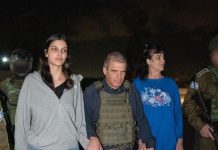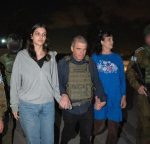By Michele Herenstein
I’d like to start by giving a shout-out to my brother Andrew, my only visitor at the Eating Recover Center besides my parents and one observant woman from Denver whom I met through a high-level staff member.
I was sad that I didn’t have any visitors; when one is in a hospital setting of any kind, visitors make a huge impact on emotions and overall feelings of wellness. I know that getting to Denver isn’t the easiest trip in the world; it’s about a four-hour plane ride, and the Denver airport is mammoth. The trip is not like hopping on the LIRR or Metro-North to New York, Connecticut, or New Jersey, or even taking a shuttle plane to Boston or Washington. It’s not really a one-day trip, and the flights can be expensive. So although I was sad that my friends and family couldn’t visit, I understood why. Hearing that Andrew was coming to visit me was exciting.
Meanwhile, I was making progress with my therapist, telling her things I had never told anyone before in my life. I looked forward to seeing her four times a week, and sometimes she’d even come find me in my room if she had something to tell me or discuss with me. It was casual that way, which made for a somewhat relaxed, laid-back atmosphere, even while hard, life-changing work was taking place.
ERC consisted of what were called villages, of which there were three. In each village were several teams. My team tried to do “fun” things on occasion. Only patients at a level where they could be trusted to follow the rules regarding food were allowed to join. On some Fridays we went to Starbucks, and each patient had to order a drink or snack that would be equal in calories to what the snack normally was at ERC. Our dietitians helped us make choices, because many of us didn’t trust ourselves yet to figure out calories and portion size. On sunny days (and there were many days in the high 70s this past winter in Denver), we would take our snacks and drinks and eat them outside. As I mentioned in my last article, this made ERC feel less like a locked facility. Trust came along with responsibility and following the rules. This is a good life lesson for pretty much anyone, but especially for patients with an illness, partly cured by learning the right behaviors and sometimes even getting rewarded for them.
Finally, it was the Sunday of Andrew’s visit. No food of any kind is allowed to be brought into ERC. Not even a stick of gum or a mint. Nothing! However, because Andrew only ate kosher and they wanted him to be able to eat with me at ERC (it’s good practice to eat with a family member and be trusted to eat everything you are served without staff present), they allowed him to bring in food from the nearby kosher deli.
I waited by the front doors for him to arrive. I was nervous and excited. I hadn’t seen Andrew in a long time, and I missed him. Finally, when he arrived and was let inside, I ran to him, threw my arms around him, and began to sob. The crying stemmed from loneliness, happiness, and just feeling incredibly emotional. I think Andrew might have had a tear or two in his eyes as well.
After a prolonged hug, we were taken to a private room for our dinner and visit. We ate, caught up, took selfies, and enjoyed each other’s company. I was extremely sad when he had to leave. We had always been close, and I resolved that we would remain so in the future.
As I was weight-restoring–putting on weight through eating balanced, nutritious meals (the food was delicious at ERC!)–I was gradually allowed certain privileges. For example, I filled out a pass, and had breakfast alone at a nearby bagel store. With my dietitian, I had figured out in advance what I would eat, and I was being trusted not to restrict while out on my pass. Another time, I went to an indoor upscale mall. It was the first time I had gotten my hair done in two months, and it felt good. At the mall, I was also expected to have a snack, so between shopping, a hair blowout, and a snack, I had a nice afternoon at the mall. I went back to ERC exhausted, not used to so much activity.
I began to think of leaving ERC for good, and since Pesach was not far away, I decided that I wanted to leave a week before Pesach. I discussed this with my team and my parents. The consensus was that I was probably not entirely ready to leave, but that I would go home for Pesach, with the option of coming back and being able to work with the same team. In my mind, however, once I left, there would be no way I’d be able to get myself back. It had been a crazy scary decision to go to ERC to begin with, and although the place was now familiar to me, it would be hard to go there again, even with the comfort of my team. Once out of ERC, I became used to more independence–no locked doors, unless I was the one doing the locking!
As the Family Resource Handbook writes, “Oftentimes, the hardest work of recovery begins when treatment ends.” I didn’t know at the time how true this statement would turn out to be.
In a structured environment, if you are a rule-follower, as I basically am, you go along with what is set up for you. You don’t need to make many decisions, as many of them are made for you–what, how much, and when to eat, when to see the members of your team, when you have to do vitals, etc. Once you are home, depending on your level of support, you must start making many decisions on your own, and your inner voice may lead you astray. The voice that you don’t want to follow is called the ED voice, the eating-disorder voice. For some, that voice is quieter when in treatment, and when treatment ends, that voice decides to take charge again, ruling your mind and thoughts. The battle after treatment is to not listen or obey the ED voice. This is so much easier said than done.
So my treatment at ERC was coming to an end. The doctors and other staff were looking for a treatment team for me in New York, preferably on Long Island, near Lawrence, where I was moving. I didn’t have a team lined up when it was time to leave.
My team decided a breakfast outing was in order since another girl and I were leaving that week. We went out to breakfast, everyone ordering a mix of bagels, fruit, smoothies, etc. It was fun, and we took some pictures to remember each other by. I had some acquaintances at ERC with whom I am still in touch via Facebook.
No one, except other patients at ERC and anyone with an eating disorder, can really understand what it is like to live with anorexia and to know that, most likely, your life will never be the same. According to ERC, “Another area in which the field of eating disorder treatment has struggled has been reaching consensus regarding the definition of ‘recovery.’ The closest the field has come to consensus is the definition of ‘remitted.’ For anorexia nervosa, remitted is defined as being weight-restored above 90% ideal body weight (IBW) and normalization of thoughts and attitudes that relate to the psychological aspects of the illness, such as the drive for thinness and body dissatisfaction.”
I can’t say I fit those criteria when I left; meaning, I don’t think my eating disorder would be considered remitted, but I did leave with hope for the future. I thought it would all sort itself out with some work–finding a team consisting of a nutritionist, a therapist, and a psychiatrist for medication, along with having meals delivered so I wouldn’t have to obsess about food.
Little did I know how truly tough anorexia is to be rid of, in thoughts, actions, and behavior. You believe while in treatment that you’re making excellent progress, and at home you might feel the same way, for a little while. But that “eating-disorder voice” may still be around, and it is the fight of your life to quiet it and eventually, hopefully, have it disappear altogether.
Quieting my ED voice is my goal at present. Coming home was exciting, but I had no idea that things would get so difficult. Hopefully next week I can share my experiences living away from ERC.
To be continued . . . v
Note: I’m writing these articles because I hope my story will provide encouragement, hope, and information that will be helpful to others. Please understand, however, that I am in the early stages of recovering from anorexia. I cannot offer medical advice or referrals to treatment.
Michele Herenstein is a freelance journalist and can be reached at michelesherenstein@hotmail.com.















